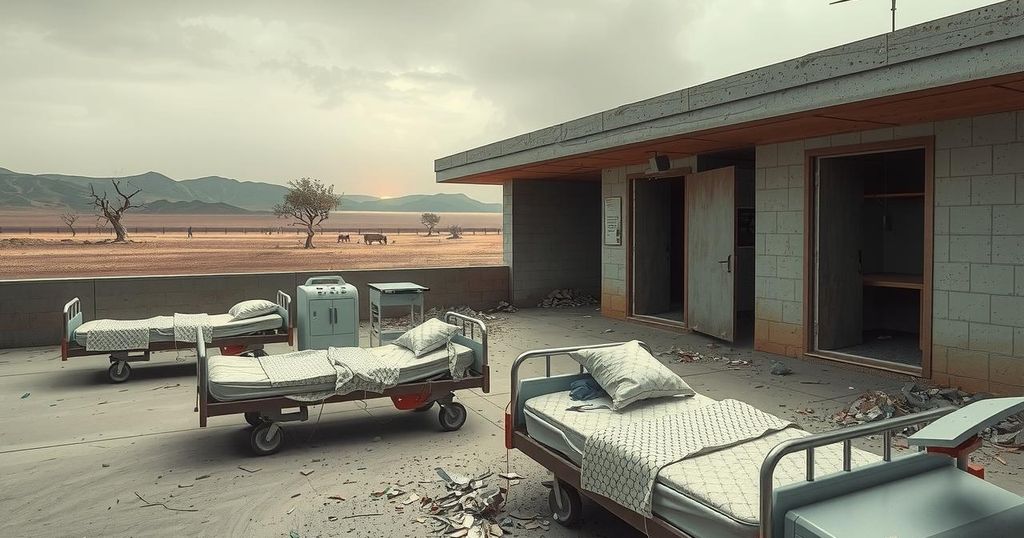Devastating Consequences of Attacks on Healthcare in South Sudan

Ongoing attacks on healthcare in South Sudan, such as the shooting of MSF boats and the looting of hospitals, devastate access to essential medical services. Community members and healthcare workers alike face trauma and challenges as outreach activities are suspended, leading to dire consequences for patient care. These incidents highlight a broader pattern of insecurity affecting healthcare delivery in the region.
In South Sudan, the ongoing attacks on healthcare have dire consequences for the population’s well-being. In January, MSF faced a harrowing incident when two of their boats were fired upon while traversing the Sobat River, forcing the international organization to halt vital outreach initiatives due to safety fears. Just a few months later, MSF’s hospital in Ulang was attacked and ransacked, leaving the community without critical medical support. The situation highlights devastating gaps in access to healthcare for those most in need.
On January 15, an MSF outreach team was returning to their base after delivering medical supplies when gunfire erupted. Both boats were visibly marked with MSF’s logo, yet the sudden strike incited chaos. Chuol, leader of the outreach team, instinctively jumped into the river in panic. Riek quickly ran to investigate after hearing the shots and was met with an empty boat drifting in the water, prompting fears that his colleagues were lost. Riek expressed, “I was shocked, I thought my colleagues were dead.”
After Chuol managed to swim to shore, he sought out his team. Thankfully, five members were safe, but one was still unaccounted for. Miraculously, Riek soon heard the cries of that missing colleague. After paddling out to him, Riek was able to help his teammate with a minor injury, ensuring he received treatment at the Ulang hospital.
MSF has been active in Ulang since 2018, providing healthcare services at various sites along the river. Unfortunately, due to the January incident, they had to cease outreach activities in that region. This decision has had a significant impact on the community’s access to medical care, as MSF’s boats were essential for transporting patients.
Ulang is rife with insecurity due to ongoing intercommunal violence and frequent armed clashes. After the attack on the boats, MSF staff members, like Chuol and Riek, struggled with emotional fallouts. “I had trouble sleeping the first few nights after the attack,” Chuol admitted. Riek said, “The shock I felt when I thought my colleagues were dead stayed with me.”
Inside the hospital itself, the repercussions of these incidents are evident. Dr. Philip noted that since suspending outreach efforts, fewer patients are being admitted. “Without MSF’s boats, those living far away can wait days, resulting in deteriorating conditions by the time they reach Ulang,” he explained. Many rely on foot travel, navigating blocked and damaged roads, especially during the rainy season.
In April, Ulang faced another blow when armed men raided the MSF hospital, looting medical supplies and equipment. This attack effectively eliminated the only fully operational health facility in the area. The fallout from such violent events further weakens the already vulnerable communities in South Sudan, leaving them without essential medical care.
The situation worsened in May with the bombing of MSF’s facility in Old Fangak, completely destroying the pharmacy. This attack left 110,000 people in the region without access to hospital-level care. David Charo Kahindi, MSF’s medical coordinator, described the chaos during the bombing, recalling the screams and fear among staff and patients.
Having witnessed almost total destruction, he lamented, “The hospital had been there for more than 10 years and was a lifeline to over 100,000 people in the area. Hospitals should never be targets.” The bombing left a void in healthcare services, and urgent requests for supplies became necessary to support displaced individuals in makeshift facilities.
The health crises in South Sudan underscore a grim reality: violence disrupts access to healthcare services, endangering the lives of countless individuals. As MSF contends with these challenges, the message remains clear — every attack erodes trust and further compromises the well-being of those caught in the crossfire.
The health system in South Sudan is under siege, with repeated attacks on medical facilities and personnel. Such violence significantly disrupts access to essential healthcare, resulting in maternal and pediatric emergencies that cannot be adequately addressed. The Halting of outreach efforts by MSF has left many communities vulnerable and without medical care. Escalating conflict in specific regions exacerbates this humanitarian crisis, necessitating immediate responses from international health organizations to prevent further suffering.
Original Source: www.doctorswithoutborders.org







